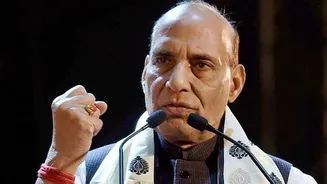What is the story about?
Defence Minister Rajnath Singh urged Bangladesh's Interim Chief Adviser Muhammad Yunus to "watch his words," as he maintains that India does not want a rift with Bangladesh. Singh gave his take on the India-Bangladesh tiff in an exclusive conversation with
Network18 group Editor-in-Chief Rahul Joshi.
During the conversation, Singh made it clear that New Delhi does not seek 'tense relations' with Bangladesh, and Yunus should be cautious about what he says. "We do not seek tense relations with Bangladesh, but Yunus should be cautious with his statements," Singh told Network18 on Friday.
"India can handle any kind of challenge, though we aim to maintain good relations with our neighbours," he added. Tensions between India and Pakistan started brewing after violent protests toppled former Prime Minister Sheikh Hasina's government. Nobel Prize Winner Yunus took over the reins as the country's interim chief advisor after Hasina left the country and is currently in India.
Since coming to power, Yunus has been pushing provocative rhetoric against India. Recently, he stirred a storm after he presented a controversial artwork to Pakistan's Joint Chiefs of Staff Committee (CJCSC) Chairman General Sahir Shamshad Mirza and a visiting Turkish parliamentary delegation.
The Bangladesh interim chief advisor gifted Art of Triumph to a five-member Turkish parliamentary delegation led by Mehmet Akif Yılmaz, earlier this week, while they were visiting Dhaka. According to The Dhaka Tribune, the book is a collection of graffiti drawn by students and youth during and after the student-led protests in the country last August.
However, as per News18, the artwork outlines a “Greater Bangladesh" plan that incorporates India’s northeastern states, especially Assam, into Bangladesh’s future strategic vision. Unnamed sources told News18 that the book presented by Yunus included “battle plans" and “post-victory management frameworks," with the alleged aim to transform Assam into a “productive and viable region" under Dhaka’s influence.
“This was not an art display but a message — one directed at specific transnational Islamist networks that see Bangladesh’s interim regime as part of a wider strategic consolidation," the source said. Hence, Yunus's recent actions and statements have deteriorated decades-long ties between India and Bangladesh.
During the conversation, Singh made it clear that New Delhi does not seek 'tense relations' with Bangladesh, and Yunus should be cautious about what he says. "We do not seek tense relations with Bangladesh, but Yunus should be cautious with his statements," Singh told Network18 on Friday.
"India can handle any kind of challenge, though we aim to maintain good relations with our neighbours," he added. Tensions between India and Pakistan started brewing after violent protests toppled former Prime Minister Sheikh Hasina's government. Nobel Prize Winner Yunus took over the reins as the country's interim chief advisor after Hasina left the country and is currently in India.
Since coming to power, Yunus has been pushing provocative rhetoric against India. Recently, he stirred a storm after he presented a controversial artwork to Pakistan's Joint Chiefs of Staff Committee (CJCSC) Chairman General Sahir Shamshad Mirza and a visiting Turkish parliamentary delegation.
What was the gift?
The Bangladesh interim chief advisor gifted Art of Triumph to a five-member Turkish parliamentary delegation led by Mehmet Akif Yılmaz, earlier this week, while they were visiting Dhaka. According to The Dhaka Tribune, the book is a collection of graffiti drawn by students and youth during and after the student-led protests in the country last August.
However, as per News18, the artwork outlines a “Greater Bangladesh" plan that incorporates India’s northeastern states, especially Assam, into Bangladesh’s future strategic vision. Unnamed sources told News18 that the book presented by Yunus included “battle plans" and “post-victory management frameworks," with the alleged aim to transform Assam into a “productive and viable region" under Dhaka’s influence.
“This was not an art display but a message — one directed at specific transnational Islamist networks that see Bangladesh’s interim regime as part of a wider strategic consolidation," the source said. Hence, Yunus's recent actions and statements have deteriorated decades-long ties between India and Bangladesh.





















